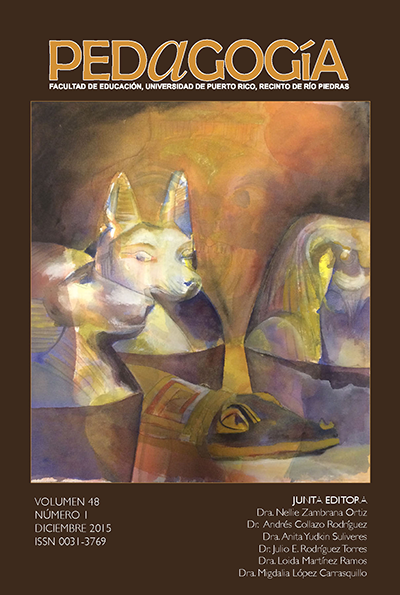Abstract
In the process of developing a formal mentoring relationship designed to support a Boricua scholar‘s entry into the academy, counterstories of persistence and endurance emerge from the give and take of written conversations over how to navigate institutional requirements for tenure and promotion. This article traces the journey of two diasporican scholars from their first encounter in July 2011, in a new space of co-existence, where they meet regularly to share and make sense of challenges they confront as community oriented scholars in teacher education programs, in large urban institutions. Writing, reading and reflecting on email exchanges, they gain consciousness of similar and different trajectories and unique cultural strengths (biliteracy, knowledge of U.S. diasporican communities, and bilingual teaching experience in public schools) that enable them to transform challenges into opportunities to meet institutional demands for teaching, scholarship, and service. At a time when scarce resources and increased workloads complicate the tenure-promotion process, shape scholarship, and get in the way of family responsibilities, counterstories by working class Puerto Rican women who successfully navigate the academy may motivate other narratives of hope that make theory building from practice (or praxis) possible.
How to cite:
Mercado, C. I., & Rodríguez-Arroyo, S. (2015). Sense-making encounters of the biographical kind: Understanding and theorizing community-oriented scholarship of Puerto Rican women in the academy. Pedagogía, 48(1), 49-71. Retrieved from https://revistas.upr.edu/index.php/educacion/article/view/16307
References
Alarcón, W., Cruz, C., Guardia Jackson, L., Prieto, L., & Rodríguez-Arroyo, S. (2011). Compartiendo nuestras historias: Five testimonios of schooling and survival. Journal of Latinos and Education, 55(4), 369-381.
Alfred, M. V. & Swaminathan, R. (Eds.). (2004). Immigrant women of the academy: Negotiating boundaries, crossing borders in higher education. New York, NY: Nova Publishers.
Allatson, P. (2007). Key terms in Latino/a cultural and literary studies. Malden, MA: Oxford.
Baez, B. (2000). Race-related service and faculty of color: Conceptualizing critical agency in academe. Higher Education, 39(3), 363-391.
Delgado-Bernal, D. (2002). Critical race theory, Latino critical theory, and critical race and gendered epistemologies: Recognizing students of color as holders and creators of knowledge. Qualitative Inquiry, 8(1), 105-126.
Dewey (1938/1997). Experience and education. New York: Macmillan.
Fiol-Matta, L. (1996). Teaching in (Puerto Rican) tongues: A report from the space in-between. Women‘s Studies Quarterly, 24(3/4), 69-76.
Gonzalez, N., Moll, L., & Amanti, C. (Eds.). (2005). Funds of Knowledge: Theorizing practices in households, communities, and classrooms. New Jersey: Erlbaum.
Heath, S. B. (1985). Literacy or literate skills? Consideration for ESL/EFL learners. In P. Larson, E.L. Judd, & L. Messerschmidt (Eds.). On TESOL 84: A brave new world for TESOL. Washington, DC: TESOL.
hooks, b. (1994). Teaching to transgress. Education as the practice of freedom. New York, NY: Routledge.
Kanu, Y. (2003, Spring). Curriculum as cultural practice: Post colonial imagi- nation. Journal of the Canadian Association of Curriculum Studies, 1(1), 67-81.
Latina Feminist Group. (2001). Telling to live: Latina feminist testimonios. Durham, NC: Duke University.
Liston, D., Whitcomb, J. & Borko, H. (2007). NCLB and scientifically-based research: Opportunities lost and found. Journal of Teacher Education, 58(2), 99-107.
Machado-Casas, M., Cantú-Ruiz, E., & Cantú, N. E. (2013) Laberintos y testi- monios: Latina faculty in the academy. Educational Foundations, 27(1/2), 3-14.
Medina, C. & Luna, G. (2000). Narratives from Latina professors in higher education. Anthropology & Education Quarterly, 31(1), 47-66.
Mercado, C. I. (1996, Summer/Fall). Critical reflection on lived experience in a bilingual reading course. The Bilingual Research Journal, 20(3-4), 567-601.
Mercado, C. I. & Moll, L. C. (2000). Student agency through collaborative research in Puerto Rican communities. In S. Nieto (Ed.), The education of Puerto Ricans in the United States (pp. 297-329). Mahwah, NJ: Lawrence Erlbaum Associates.
Pimentel, F. (2002). The decline of Puerto Rican fulltime faculty at the City University of New York (CUNY). Policy Brief, 2(3). New York, NY: Centro de Estudios Puertorriqueños.
Reyes, X. A. (2005). Dissonance and dialogue in the academy: Reflections of a Latina professor. (Reflexiones Pedagógicas section). Latino Studies Journal, 3(2), 274-279.
Reyes, M de la Luz & Halcón, J. (1988). Racism in academia: The old wolf revisited. Harvard Educational Review, 58(93), 299-314.
Reyes, X. A. & Rios, D. I. (2005). Dialoguing the Latina experience in higher education. Journal of Hispanic Higher Education, 4(4), 377-391.
Rivera, M. (2009). Ángeles, sacrificios, y Dios: A Puerto Rican woman‘s jour- ney through higher education. Harvard Educational Review, 79(4), 553-559.
Selwyn, D. (2007, March/April). Highly-qualified teachers. NCLB and teacher education. Journal of Teacher Education, 55(62), 124-137.
Torres, C. A. (2004). No Child Left Behind: A brainchild of neoliberalism and American politics. New Politics, X(2).
Torres-Gúzman, M.E.(1995). Surviving the journey (53-650. In R. V. Padilla & R.C. Chavez, eds., The Leaning Ivory Tower: Latino professors in American Universities. Albany: State University of New York.
The contents published in the Puerto Rico Journal of Education is freely distributed under open access practices, in accordance with the Creative Commons license, Attribution-NonCommercial 4.0 International (CC BY-NC 4.0). Through these principles, the journal and its authors allow readers to access, reproduce and share articles in full text. Users should give credit to authors in a reasonable way without suggesting they have their support. Under no circumstances, readers may make use of the contents for commercial purposes. The authors retain copyright on their works.

